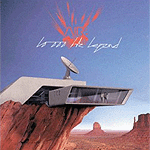 |
 |
|
|
|
| |||
 Air
Air10,000 Hz Legend [Source/Astralwerks; 2001] Rating: 7.6 I wouldn't say she was a lost cause, but my girlfriend needed a music doctor like I needed, well, a girlfriend. That is, desperately. Call it a perfect match. She'd spent too many years clubbing to have more than a passing knowledge of non-techno music, and I'd spent too many years shucking to have more than a passing knowledge of monogamous sex. The results have been fast, effective, and largely painless. She's taken to the Pixies, and I've taken to, um, lots of sex. Air's debut, 1998's Moon Safari, is not only a pop classic of retro-futurism; it also provides a damn fine soundtrack to the otherworldly act of sex. Needless to say, we became well acquainted with the album, which both of us were already fond of to begin with. Their soundtrack to Sofia Coppola's directorial debut, 2000's The Virgin Suicides, was a similarly fluid pour of analog synths, but the album was a less pop-oriented, more minor-key affair. And if you've seen the movie, you can understand why I wouldn't want to do "the beast with two backs" while listening to its irrevocably-linked score. So would Air's official follow-up to Moon Safari be a return to coital form? I'll let my girlfriend do the talking: "Weird." That would be the opener, "Electronic Performers." She wasn't necessarily turned off by the deep bass thumps that rip into electronic handclaps. Or the occasional heavy rapping, like the landlord at your door a day after the rent's due. And it definitely wasn't the radar beeps or the fluctuating machinations of the keyboard. I think it was the vocals. Accompanied by a natural piano, a distorted voice sings, "We are the synchronizers/ Send messages through time code." And it is weird, like something Dean and Gene Ween would come up with. But with lines such as, "We need to use envelope filters/ To say how we feel," the track is also an oddly beautiful lament. "The Radiohead voice!" Yes, a whispery version of the fitter, happier Macintalk voice makes an appearance on the love song, "How Does It Make You Feel?" But a real voice-- resident keyboardist Roger Joseph Manning Jr.-- sings the ELO-inspired chorus. The beat, meanwhile, is cut from the exact same mold as The Virgin Suicides-- from the dark, ambling pace all the way down to the angelic voices coalescing in the background. But whereas that album-- and "the Radiohead voice," for that matter-- remain serious to the end, this song concludes with a funny moment. After listing off his feelings, the male computerized voice receives an abrupt retort from a female computerized voice: "Well, I really think you should quit smoking." "It's like rock-n-roll." "The Vagabond" makes you wish for a full-length Beck/Air collaboration. But at first, it's all Beck: a harmonica solo, folky acoustic strumming, Beck's distinctive, marble-mouthed vocals, and tolls ringing in the background. You'd think he donated a b-side from Mutations. That's when Air's laser-gun atmospherics shoot forth. The drums that kick in midway are also decidedly more similar to Air's previous work. Beck even ends the number with his trademark falsetto and a cackling laugh a la "Hollywood Freaks," so yes, she's right: this is rock-n-roll. But then again, a moment later she said, "Honey, isn't rock-n-roll a weird name?" "Is this the same album?" By the halfway mark, "Lucky and Unhappy," the poor girl had been thrown for more than one loop-- not to mention "Radian," Air's most overwrought Bacharach-inspired track to date. And now here was this untraceable throbbing, this eerie computerized whirring, voices of different distortions, and an acoustic guitar to ground it all; then a skittering beat and a swirling orchestra; and even later, static popping and off-key keyboards. Songs from the album's second half provided little relief. "Sex Born Poison" pairs a vocoderized voice with the Japanese vocals of Buffalo Daughter; then, for good measure, adds what sounds like digital Ping-Pong-- or maybe the noises "Mike Tyson's Punch-Out!!" makes while Little Mac is popping King Hippo in the gut and mouth. After opening with a thick electro-pulse and digi-congos, the chantey "People in the City" reaches a simple acoustic epiphany-- think the Beta Band's "Dry the Rain"-- before descending into muddled feedback and heavy electronic gurgling. And the final number, "Caramel Prisoner," is an ambient come-down-- kind of like a rollercoaster coming to rest with a bloody, broken-nosed Fabio aboard. "I like it, but it's kind of all over the place." I'm a little scared to admit it, but we're on the same page here. The barely cohesive 10,000 Hz Legend is both a concern and a relief. There's only one truly catchy song-- the Low-era Bowie-esque "Radio #1"-- but it doesn't have quite the same bounce (not to mention single potential) as "Sexy Boy." So you probably won't hear any of these songs on the radio, and I can say with absolute certainty that this won't be Details' album of the year, as Moon Safari was. I don't say this because it matters, but rather to indicate that Nicolas Godin and Jean-Benoît Dunckel have steadfastly refused to be pigeonholed. For better or worse, this is not Moon Safari Redux. The obvious comparison that my girlfriend should have made is to the Chemical Brothers, who took a similar stylistic leap on their last album, 1999's Surrender, even though staying the big-beat course would have been the easier and more profitable thing to do. But for some reason Spike Lee's work also comes to mind: there are plenty of hits and misses, but the experience is worth it for the invigorating knowledge that this critically established artist isn't afraid to take his art in new directions. Plus, my girlfriend and I love that Spike always slips a hot sex scene into his films. -Ryan Kearney, May 29th, 2001
|
|||

